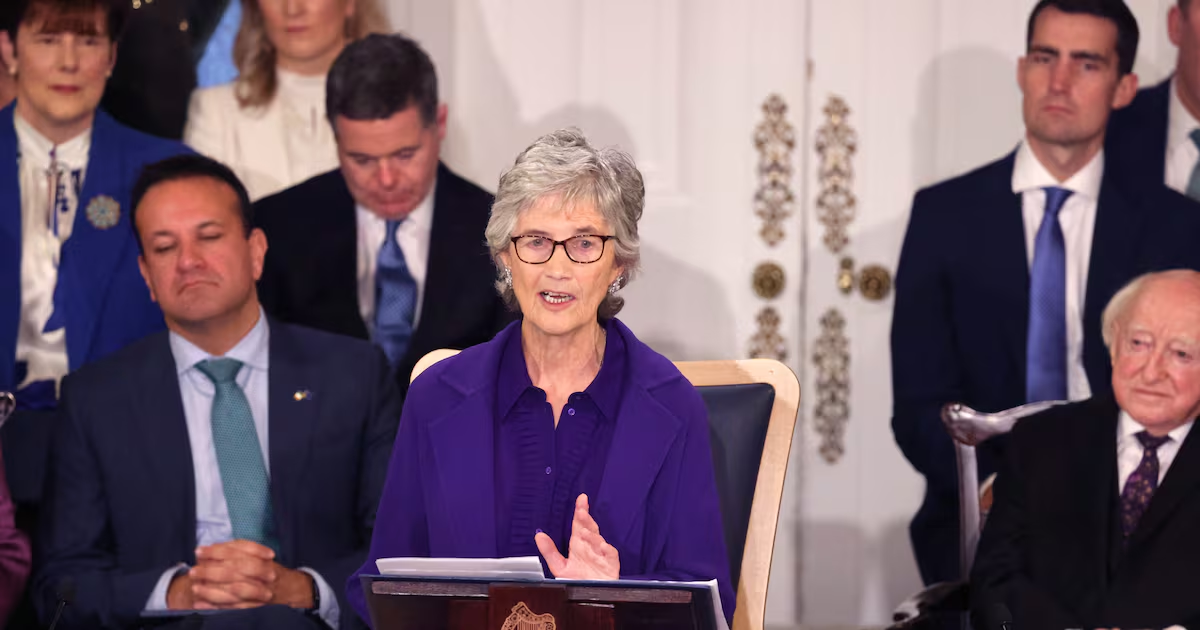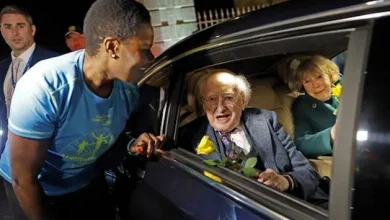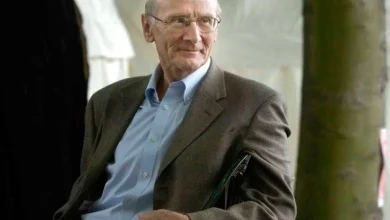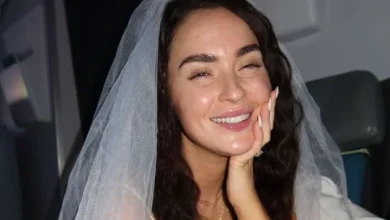The six lines that tell us what sort of president Catherine Connolly will be

‘They have given their President a powerful mandate to articulate their vision for a new Republic.’
There was no mistaking the political nature of President Catherine Connolly’s first address. She spoke of a vision for a new Republic and of her being a “catalyst” for change. She outlined some of its principles: where everybody is valued, diversity is cherished and having a home is a fundamental human right.
‘A small group of elected representatives and volunteers [faced] what appeared to be insurmountable challenges.’
Here the President referred to the left-oriented and radical nature of her campaign, arguing that it defied the prevailing consensus that “the ideas were too far out, too left, at odds with the prevailing narrative”.
In a strong criticism of political orthodoxy in Ireland, she argued that the dominant narrative – which must be taken as the positions adopted by the Government parties – did not reflect people’s values and concerns.
She said that narrative served to “silence, to other, to label, and to exclude and to stifle critical thinking”.
She argued that, despite that, a new “hope” emerged and said that as president she would ensure all voices were represented.
‘Previous presidents faced different challenges reflecting the dominant issues of the day.’
This section afforded the President the opportunity to pay tribute to her three immediate predecessors (all of whom were present) as well as giving her analysis of the changes they effected. It was a prelude to her setting the context for her presidency.
She said Mary Robinson was president at a time the Berlin Wall had fallen and there was a big shift in geopolitics. In Ireland, there was a “seismic” change towards an inclusive society. Mary McAleese had been president at a time when the Belfast Agreement was signed, setting out a shared vision for the future.
Michael D Higgins came into office at the time when the global financial collapse shook Ireland and the world. She said the reverberations of that were still being felt today.
‘We face the existential threat of climate change and the threat of ongoing wars.’
The President moved to a central theme of her speech. She contended that climate change and wars are “inextricably linked”.
She pointed to 165 million people being displaced by war, famine and climate change.
“We cannot turn back the clock or close our eyes to these realities.
“Our actions or inaction will determine the world our children and grandchildren will inherit.”
She used a key word of her campaign, “genocide”, in the next passage, saying its normalisation should never be accepted.
Another key word, “neutrality”, came in the next sentence. She signalled she will defend it and Ireland’s long peacekeeping tradition stretching back to 1958.
Echoing her comments during the campaign, she referred to alternative diplomatic solutions.
‘We can take real pride in the success of the Good Friday agreement.’
Ms Connolly made several comments alluding to her desire for a united Ireland during her campaign, which were enough to persuade Sinn Féin to give her its backing.
She strongly supported the Belfast Agreement (also known as the Good Friday agreement) but also said she believes in a united Ireland.
She said it must be achieved within the conditions laid down by Article 3 of the Constitution and she specifically referred to “consent”.
‘Ligimis don Ghaeilge blathú.’
In a long passage of the speech in Irish, the President made it clear that Irish will have a central role in her presidency. She said it will be working language of the Áras and said she will use it frequently on all occasions.
She started the section by saying that for many years the “soul and spirit” of Irish were suppressed, sometimes deliberately, at other times by neglect or a lack of understanding.
[ Is Catherine Connolly’s plan to make Irish the language of the Áras a good idea?Opens in new window ]
“Tír gan teanga, tír gan anam,” she said, employing an old saying – a country without a language, a country with a soul.
“Ligimis don Ghaeilge blathú,” she said a little later – let us allow Irish to blossom.
Continuing in Irish, she said: “Let us listen to those who want no more than recognition for the language in their own country, Gaeilgeoirí.
“Irish will not be spoken in a low voice in the Áras, it will have first place as a working language,” she said.





